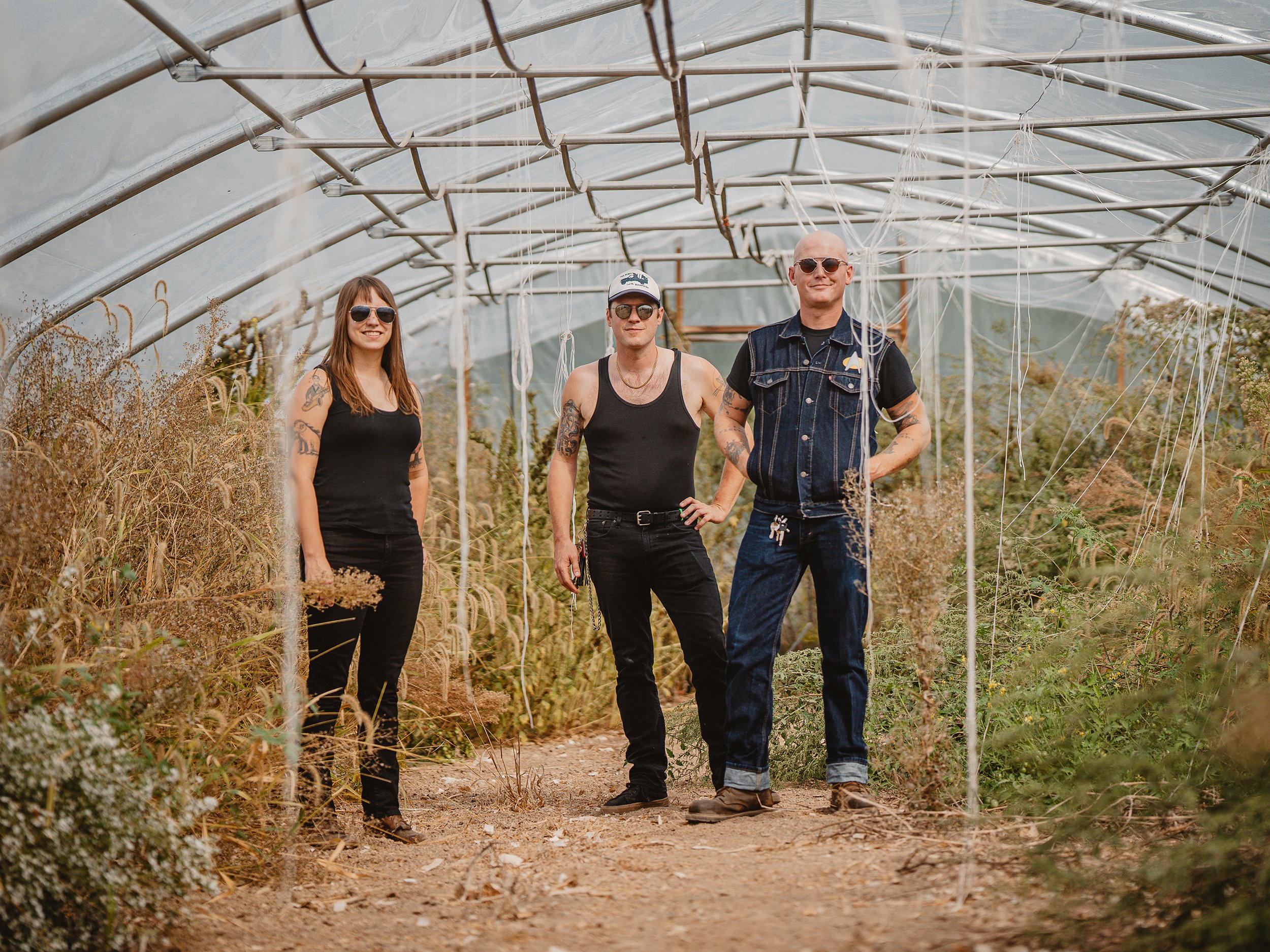The Hooten Hallers - Back In Business Again
September 9, 2022
For the past fifteen years, The Hooten Hallers have been crisscrossing the country as inveterate road warriors, bringing their peculiar vision of Americana–a fiery rock and roll fever dream birthed in Missouri’s fertile musical heartland. They’ve put so many miles into the road that they’ve burned through multiple tour vans and left twisted metal and frayed rubber strewn across the road behind them. With their aptly named new album, Back In Business Again, the trio roar back on to the international stage with ten incendiary new original songs drawn from their many travels and inspired by the hardships that all touring musicians have faced throughout a seemingly never-ending pandemic. There’s hope in these new songs, but tinges of madness too, driven by the raw drumming of Andy Rehm, the infernal growl and swirling guitars of John Randall, and the low rolling baritone and bass saxophones of Kellie Everett. The Hooten Hallers have always been musical colliders, smashing together everything from pre-war jazz to Chicago blues with jaunts around New Orleans and garage rock explorations with hints of anti-racist punk and Oi!. It’s Morphine meets ZZ Top along St. Louis’ Mississippi waterfront. Produced by bassist Dominic Davis (Jack White, Greensky Bluegrass), Back In Business Again takes a match to The Hooten Hallers’ fuse and explodes the renegade power trio to the edge and back again, one vigorous, swinging, perfectly peculiar song at a time.
Recorded in St. Louis at Native Sound, Back In Business Again has a fierce hometown spirit. The Hooten Hallers have survived some of their hardest times over the past few years thanks to the support of their Missouri communities. Native Sound sits right above The Whiskey Ring, a beloved watering hole for locals and the bar where Everett got married. Between sessions, the band would retreat to the bar for a well earned drink with friends and family. St. Louis itself has always been an inspiration to the band, a city as influential to American music as New Orleans but with an oft unheralded history. As Everett says, “St. Louis was a pretty big hub for blues, ragtime, early jazz, and country; there was a lot of mixing of musical styles with the different people immigrating and settling there. Missouri has an important musical past and it continues to be relevant.” This celebration of overlooked Midwestern musical history is a key part of The Hooten Hallers’ ethos. As Rehm puts it, “we are not ashamed to be from a flyover state, we’re not trying to be part of the homogenous monoculture of popular music.” It’s one of the reasons that they like to travel far from the beaten path when touring. “We find the special things outside of the urban zones,” Rehm says. “We go places a lot of bands don’t go, and you find the real ones when you get off the interstate. We’ve met a lot of lifelong friends in these smaller towns that people might talk shit about or have never heard of.”
Though The Hooten Hallers are known for their incendiary live shows on the road, time in the studio and help from their producer gave them the space to expand their sound a bit. Historically, Rehm has always performed as a standing drummer, out of necessity adapting a technique from punk bands like The Ramones to move hi-hat rhythms to the floor tom, but on the new album and on stage he’s sitting down and expanding the sound of his once stripped-back drum set. Likewise, Everett was able to expand her brass sounds with new arrangements and additional horn parts, and Randall was able to bring in further ranging influences to his guitar playing, everyone from MC5, AC/DC, Bo Diddley, Lightnin’ Hopkins, and The Stooges. The blues has always been a core influence on the band, and that’s still clearly evident here, though Randall’s quick to point out that they don’t fit in with most modern blues bands. Producer Davis came to the band through Everett’s husband Ryan Koenig (who plays harmonica on the album) and his time with Pokey Lafarge and Jack White’s Third Man Records. Davis is from Detroit and is a key part of White’s sound, so he brought some Motor City vibes to the new recording through his bass playing and his tasteful ear for the urban Midwest roots of Americana. Though the studio gave everyone the chance to spread their wings a bit, it’s clear that the band’s managed to keep much of the energy they bring to their live shows, a difficult task.
Bubbling beneath the rip-roaring surface of the new album are all-original songs of outsider Americana delight, from tall tales about near-mythological characters, to a eulogy commemorating the demise of 15 years worth of tour vans, to heartfelt blues, thoughtful love songs, and well beyond. Each band member contributed songs equally, and some were clearly drawn from specific experiences, like “Cat Scrap” written by Randall for the nighttime misadventures of his cat. “Vankiller” is a tongue-in-cheek ode to the many tour vans the band has blown through over the years, as Everett says. “We’ve had some wild vehicular incidents over the years. We’ve lost whole wheels on the interstate; we had a horrifying rollover in a blizzard in Montana. We’ve put a lot of miles on a lot of vehicles.” The title track is perhaps the closest to the theme of the album: coming out on the other side of a desperate or difficult situation. As Randall explains “it’s a feel good song about shaking off the dust and finding joy where there previously was none. It’s about getting your groove back.” Listening to the howls and growls of The Hooten Hallers’ new album, to the burning sax lines and punk-heavy drumming, you’ll hear the pure joy of a band reveling in their newfound groove.


